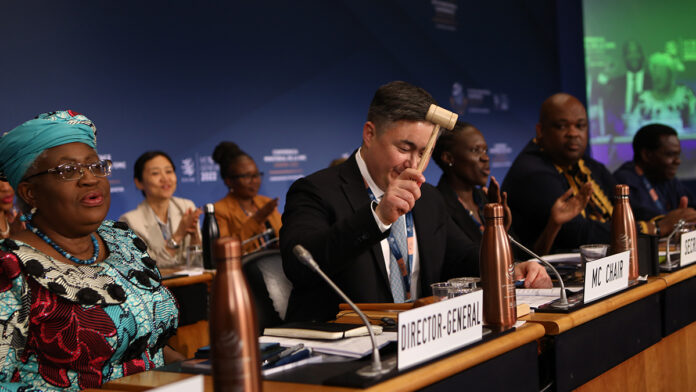- Multilaterally negotiated accords on key trade initiatives were reached at the extended World Trade Organization’s 12th Ministerial Conference
- Key decisions reached on limiting fisheries subsidies and partial waiver of intellectual property requirements for COVID-19 vaccine licensing
- An agreement to extend a moratorium on applying duties to electronic transmissions was also reached, a move crucial to the free flow of data around the world
- Differences on certain issues in agriculture put off until next ministerial meeting
After five days of intense, round-the-clock discussions, the 12th WTO Ministerial Conference in Geneva concluded on June 17 with multilaterally negotiated outcomes on a series of key trade initiatives that the UN agency’s leader said “will make a difference to people’s lives”.
The “Geneva Package” contains a raft of unprecedented decisions that include restrictions on fisheries subsidies and the World Trade Organization’s response to emergencies, particularly a partial waiver of intellectual property rights for licensing of COVID-19 vaccines; food security and agriculture, and WTO reform.
WTO Director General Ngozi Okonjo-Iweala, however, admitted that the ministers still have to reach consensus on certain issues on agriculture in the next ministerial meeting in 2023.
Acknowledging the “vital importance of agriculture,” Okonjo-Iweala noted that the differences included public stockholding for food security purposes, domestic support, cotton and market access, which “meant that we could not achieve consensus on a new roadmap for future work.”
However, “members found a renewed sense of purpose: they are determined to keep at it on the basis of existing mandates, with a view to reaching positive outcomes at MC13,” she said, referring to the 13th WTO Ministerial Conference.
The WTO said in a press release that the package confirms the historical importance of the multilateral trading system and underlines the important role of the WTO in addressing the world’s most pressing issues, especially at a time when global solutions are critical.
“The package of agreements you have reached will make a difference to the lives of people around the world. The outcomes demonstrate that the WTO is, in fact, capable of responding to the emergencies of our time,” said Okonjo-Iweala.
Okonjo-Iweala expressed her conviction that “trade is part of the solution to the crises of our time” and noted the WTO “can and must do more to help the world respond to the pandemic, tackle environmental challenges and foster greater socio-economic inclusion.”
Two of the most high-profile initiatives were restrictions on fishing subsidies and partial immunity from intellectual property rights for COVID-19 vaccines.
The multilateral trade agreement to limit fisheries subsidies is seen as promising to address a long-standing problem of overfishing in global fisheries. Isabel Jarrett, head of Pew Charitable Trusts, said the agreement was a turning point in addressing the global overfishing crisis.
Negotiations had been underway at the WTO for more than 20 years to ban fisheries subsidies, which in the past were mostly seen as an incentive to encourage overfishing by fishermen and pose a great threat to the sustainability of the planet’s fish stock.
A consensus was finally reached on the IPR exemption of COVID-19 vaccines after nearly two years of negotiations. The agreement will allow developing countries to manufacture and export vaccines on their own in the future without obtaining the consent of patent holders of the vaccine.
The vaccine deal is a major victory for Okonjo-Iweala, the group’s first female African-born leader who has worked hard in recent months to advance the talks, hoping to reach a consensus.
The WTO ministers also passed a separate agreement to maintain “temporary exemptions from e-commerce tariffs”, a move crucial to the free flow of data around the world.
Initially scheduled to end on June 15, the ministerial gathering was extended by two days to allow more time for negotiations to reach agreements. Co-hosted by Kazakhstan, the Conference was chaired by Timur Suleimenov, first deputy chief of staff of the Kazakh President.
In his closing remarks, Mr Suleimenov thanked Okonjo-Iweala for never giving up. “Her determination, her leadership, her perseverance made all the difference. Dr Ngozi, the WTO owes you a great debt.”
The ministerial conference requested the WTO General Council to meet and decide on the date and venue of the 13th Ministerial Conference.
Okonjo-Iewala recalled that the “Decision on the Work Programme on Electronic Commerce” contains an understanding that MC13 should ordinarily be held by December 31, 2023. Two proposals — by Cameroon and the United Arab Emirates — have been received to host the ministerial gathering.
One media report quoted people familiar with the matter as saying the negotiations at one point were deadlocked by multiple demands from India and some developing countries. These differences were later mediated.
WTO regulations require that all decisions are made by consensus, meaning the approval of all member states must be obtained before the resolution can be passed.





